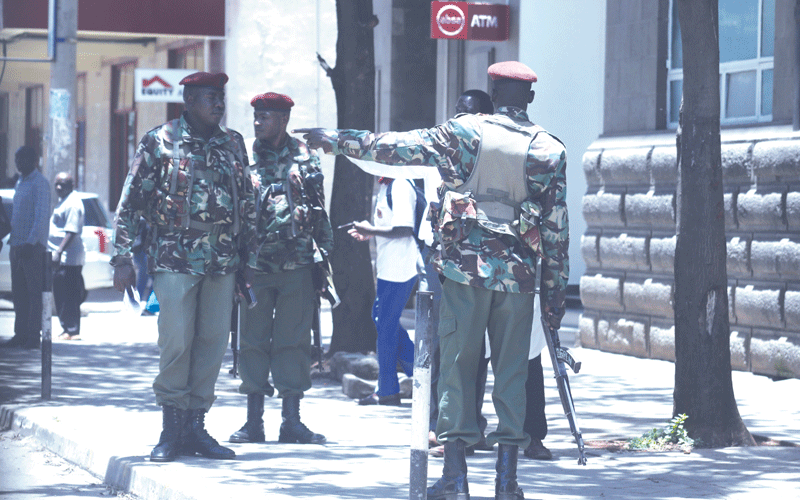70,000 police officers to enforce curfew in efforts to tame virus
By People Team, March 27, 2020Eric Wainaina and Zadock Angira
The National Police Service will from this evening deploy at least 70,000 officers across the country to enforce the dusk-to- dawn curfew declared by President Uhuru Kenyatta on Wednesday as part of measures to tame spread of coronavirus.
To emphasise the seriousness of the 7pm to 5am curfew, the police service, through communication director Charles Owino, warned that those who violate it risk a three-month jail term.
Yesterday, Interior Cabinet Secretary Fred Matiang’i, gazetted the curfew, making it legal in preparation for the implementation started today.
“Under this Order, there shall be no public gatherings, processions or movement either alone or as a group for the period of the curfew,” said the notice in part.
The curfew, which runs from 7pm to 5am, was declared after the number of those affected by the deadly flue rose to 28 by Wednesday, and hundreds on other suspected cases put on close monitoring.
Three more cases were reported yesterday, bringing the total to 30 after one patient died later in the day.
Officers recalled
Yesterday, while Owino declined to give the exact number of officers and how they will be deployed, he said there are “adequate police officers” after Inspector General of Police Hillary Mutyambai recalled officers who were on leave.
“The Inspector General last week recalled all police officers who were on leave and with the curfew, we have enough number of police officers who will be moving around the country to ensure that Kenyans remain indoor in the hours directed and also provide security,” Owino said.
There are 120,000 police officers in the country, drawn from the regular and administration police units, and according to sources, over 50 per cent will take part in enforcing the curfew which is the first since 1982 coup.
Though police are currently not detaining suspects to avoid crowding in the cells, police said, persons who will defy the 7pm to 5am curfew will have their day in court once the situation normalises.
Minimal contact
Yesterday, Mutyambai cautioned the heads of police stations against arresting and detaining petty and traffic offenders, saying it was against the government directive to decongest cells.
In a statement signed by Titi Ayiera on his behalf, Mutyambai warned that stern action would be taken against errant officers.
“This behaviour is against the government directive for the maintenance of minimal contact between individuals and social distancing to mitigate the spread of Covid-19 in the criminal justice sector…Disciplinary action will be taken against such OCS.
In addition, the county commander in whose jurisdiction such cases occur will be held personally responsible for abdicating your supervisory duty,” he said.
Those arrested persons will, however, be released on cash bail and free bonds following the directives by Chief Justice David Maraga that no prisoners or remandees will be presented to court in the next few days.
Punishment for the offence, Owino said, would be guided by Section 8(6) of the Public Order Act, which provides for the applicable sentence and fine.
“Any person who contravenes any of the provisions of a curfew order or any of the terms or conditions of a permit granted to him under subsection (1) of this section shall be guilty of an offence and liable to a fine not exceeding Sh1,000 or to imprisonment for a term not exceeding three months, or to both such fine and such imprisonment,” the section reads.
However, Owino said police officers would consider special cases where members of the public might be forced to be out during the curfew.
“Officers have the discretion to decide the action to take. The curfew does not mean that members of public who have, for example, sick relatives cannot take them to hospitals,” Owino said.
Essential services
The curfew will not apply to workers offering essential services including police, media, food, medicine and petrol suppliers, mobile service providers, the fire brigade and emergency services. Others include Kenya Power and supermarkets.
George Musamali, a security expert, told People Daily that the government, through the police, would apply all reasonable measures to ensure that the curfew is adhered to. He argues that although the measures put in place to fight the virus discourages detention in police stations to avert crowding in police cells, it does not bar officers from arresting and prosecuting offenders.
“It’s not a must that the offenders will be detained in a police station because there is the option of a free bond where dates will be issued on when to appear in court without being asked to pay any money”.
“But if it will be established that the suspect is a notorious offender, the police have an option of issuing cash bail to ensure the suspect avail him or herself in court once the pandemic is sorted,” Musamali said.
However, he said, the government hopes that because the country is dealing with a pandemic, Kenyans will not require pressure to obey the curfew.
The President, in his address at State House, Nairobi on Wednesday, said the National Security Council was forced invoke the Public Order Number One on coronavirus pandemic to restrict movement of people because Kenyans had been reluctant to adhere to behavioural protocols by the Health ministry to tame the virus spread.
Uhuru insisted that Kenyans must be prepared to have their lives affected by the measures imposed until the nation conquers the pandemic.
“If the measures are deemed to be inadequate, we shall, without hesitation, take even further and more drastic measures to ensure that the cardinal duty of the government and of the State which is the protection of life and property is assured,” the President said hinting at a total lockdown should Kenyans defy the curfew orders.
